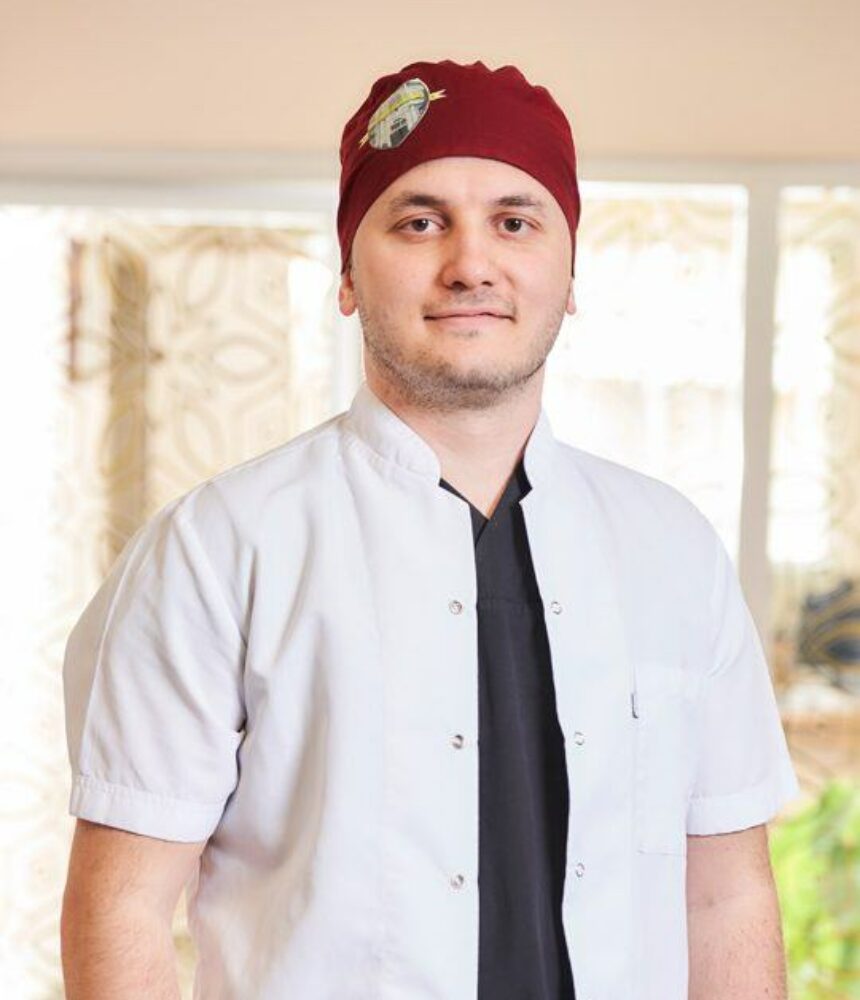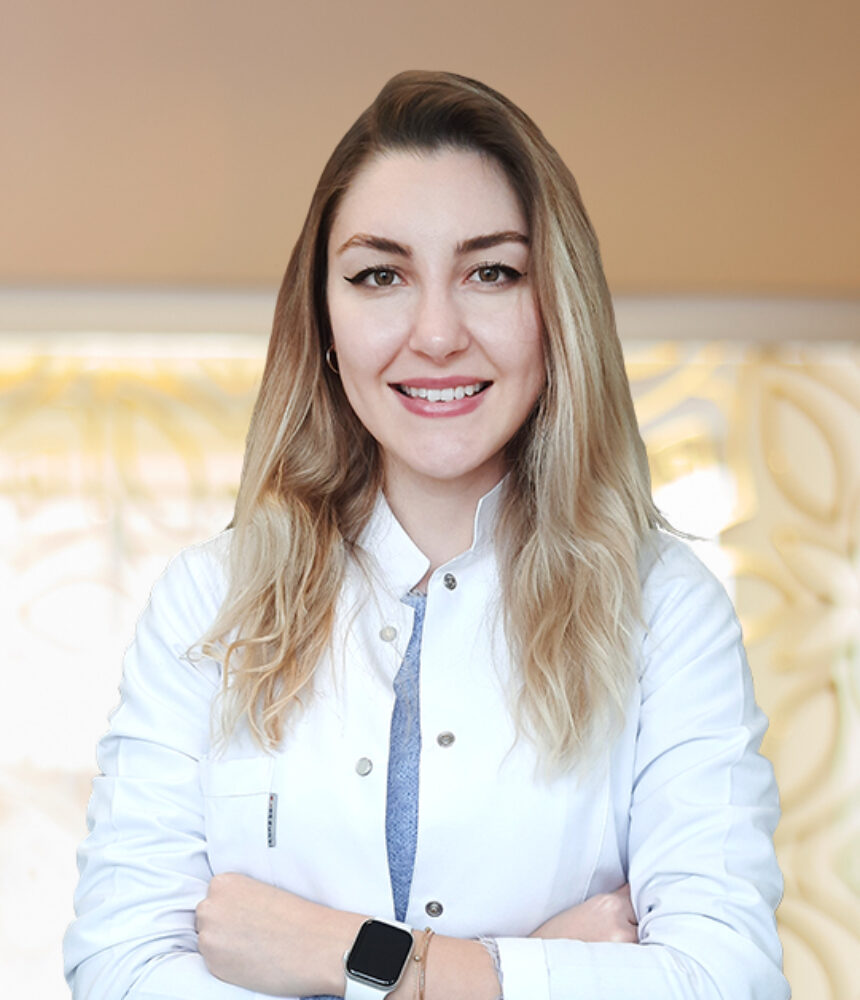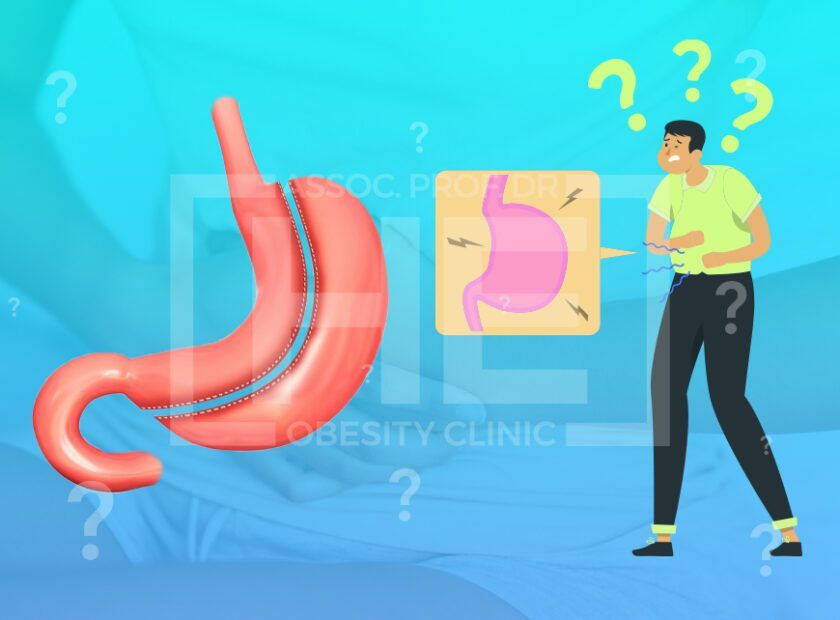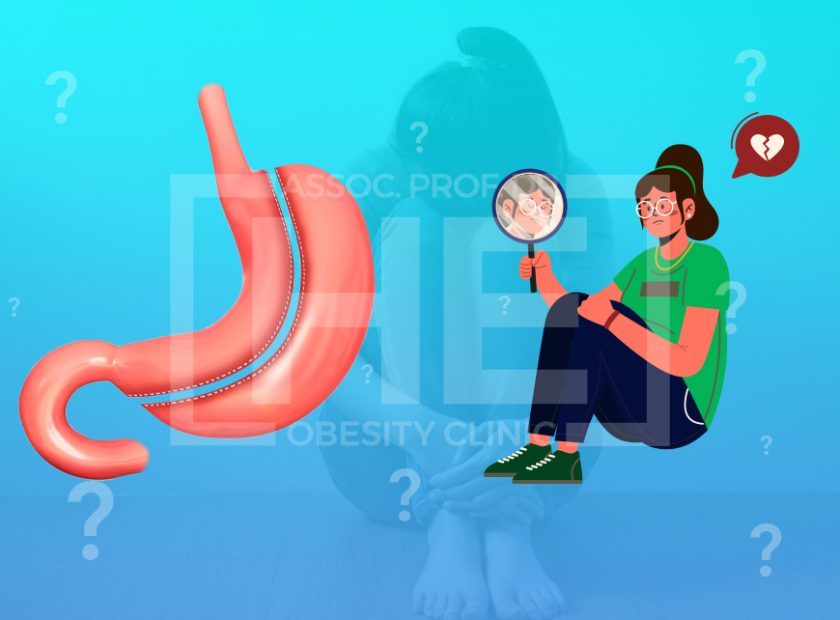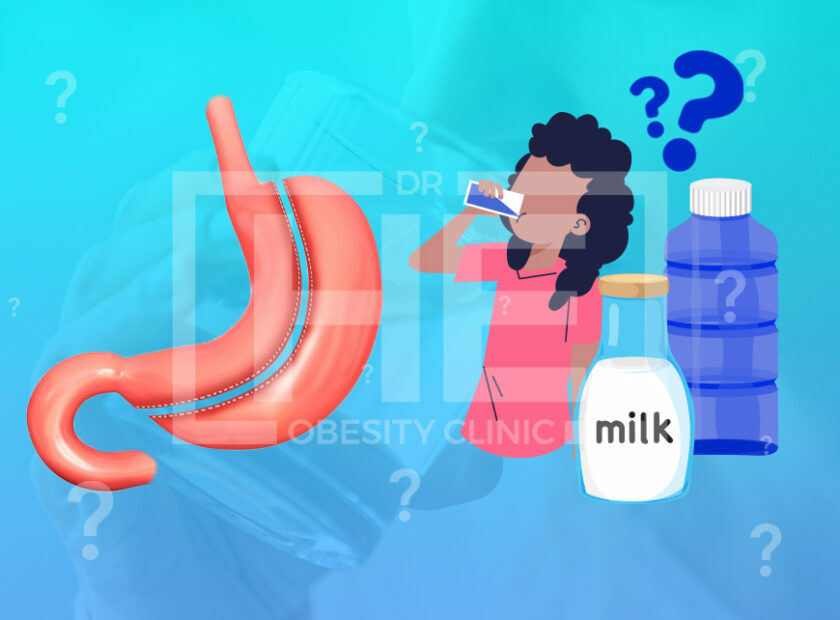Gastric sleeve surgery Turkey Istanbul, gastric sleeve surgery Turkey price, gastric sleeve surgery in Turkey, gastric sleeve Turkey package, gastric sleeve Turkey all inclusive, gastric sleeve Turkey price, gastric sleeve cost Turkey, best doctor for gastric sleeve in Turkey. How much is gastric sleeve surgery in Turkey? In Istanbul, Turkey, bariatric surgery experts have honed the gastric sleeve procedure to a high standard of excellence. This technique stands out as a beacon of hope for those grappling with obesity’s severe health risks. Renowned for its safety, the surgery offers a promising pathway to a healthier life for patients. Particularly, those facing life-threatening conditions linked to excessive weight find a reliable solution in this treatment. Moreover, it presents a cost-effective option for individuals seeking medical interventions at a fraction of the cost found elsewhere. Known officially as vertical sleeve gastrectomy, this operation is tailored for candidates with a BMI that surpasses 35. Consequently, it emerges as a pivotal intervention in the global fight against obesity-related illnesses. As such, the city of Istanbul becomes a pivotal destination for countless international patients seeking this life-altering surgery.
Dr. Hasan Erdem Dr. HE Obesity Clinic is a leading healthcare facility in Turkey specializing in bariatric surgeries, including gastric sleeve surgery. With a team of experienced surgeons, state-of-the-art technology, and a patient-centered approach, the clinic is dedicated to providing safe and effective weight loss solutions for patients from around the world.
Gastric Sleeve Surgery Turkey
Best Doctor for Gastric Sleeve in Turkey
In order to undertake a complete laparoscopic Gastric sleeve surgery, commonly known as “closed” surgery or LSG, it will be necessary to administer general anaesthesia within a hospital setting. Subsequently, the surgeon will proceed to create approximately five small incisions in the abdominal region. The surgeon shall subsequently employ a slender, elongated endoscope equipped with a diminutive camera to execute the procedure. Instruments shall be introduced through the incisions with the intention of extracting approximately 80% of the gastric volume. Proficient laparoscopic surgeons have the capability to execute numerous procedures via laparoscopy, akin to those performed through open surgery.
The abdominal cavity is distended through the introduction of carbon dioxide gas in order to generate a suitable working area. Subsequently, a trocar, a specialised instrument, is employed to gain access to the intra-abdominal cavity. The surgeon initiates the procedure by positioning a silicone tube, extending from the oral cavity to the gastric outlet, in order to modulate the residual width of the stomach. The stomach is subsequently dissected from the perivisceral adipose tissue enveloping it, along with the associated vasculature and the contiguous splenic organ. The surplus portion of the stomach is excised and partitioned using specialised instruments known as staples. Following the completion of the procedure, it is anticipated that a residual stomach volume of approximately 80-150 ml will persist.
The dissected segment is extracted from the abdominal region and subsequently dispatched for pathological examination. Subsequently, haemorrhage is managed within the incised and stapled region. If deemed necessary, supplementary metal clips or sutures may be employed to attain haemostasis. Furthermore, it is possible to administer specific medications at the site of the wound in order to effectively cease the flow of blood. A silicone drain is introduced into the surgical site to facilitate the evacuation of accumulated fluids. Ultimately, the wound has been aesthetically sealed, thereby concluding the procedure.
| Gastric Sleeve Surgery in Turkey Brief Details | |
| Eligibility: | +35 BMI |
| Processing time: | 1 hour |
| Surgical procedure: | Yes |
| Stitch: | Dissolvable |
| Anesthesia type: | General |
| Incision: | 5 |
| Hospital Accreditation: | ISO |
| Recovery time: | 7 days |
| Accommodation: | 7 days |
| Cost: | 4000 USD |
| Package: | All Inclusive |
Gastric sleeve surgery, a prominent weight loss procedure, is meticulously conducted by medical professionals in Istanbul. Before the process initiates, patients are placed under general anesthesia, ensuring a pain-free experience throughout the operation. The surgical team skillfully makes a series of small incisions in the abdomen, which serves as ports for the laparoscopic instruments. These tools, including a camera-tipped device, allow the surgeon a detailed internal view, ensuring precision during the surgery.
The steps include:
- Inflating the abdominal cavity with carbon dioxide to provide working space.
- Inserting a trocar to access the abdominal cavity.
- Introducing a silicone tube to gauge the stomach’s remaining size.
- Carefully separating and removing a large portion of the stomach.
- Sending the excised stomach tissue for pathological analysis.
- Managing any bleeding in the area with additional sutures or staples if required.
- Applying specific medications to the site to prevent excessive bleeding.
- Placing a silicone drain to remove fluids post-surgery.
- Closing the incisions aesthetically to complete the procedure.
Following the removal of the stomach segment, the surgical team ensures that the remaining stomach is secured and any bleeding is meticulously controlled. The application of specialized medications directly to the wound aids in hemostasis. Moreover, to manage postoperative fluid drainage, a silicone drain is placed strategically within the surgical site. The careful closure of the surgical wounds marks the end of the procedure, with an emphasis on minimal scarring for the patient.
Throughout the process, the surgeons’ adept use of laparoscopic techniques mirrors those used in open surgeries, albeit with the benefits of less postoperative discomfort and a quicker recovery period. The result leaves the patient with a significantly reduced stomach size, facilitating weight loss and an improved quality of life.
Gastric Sleeve in Turkey: A Safe and Affordable Option for Weight Loss Surgery
Who Is Eligible For Gastric Sleeve Surgery?
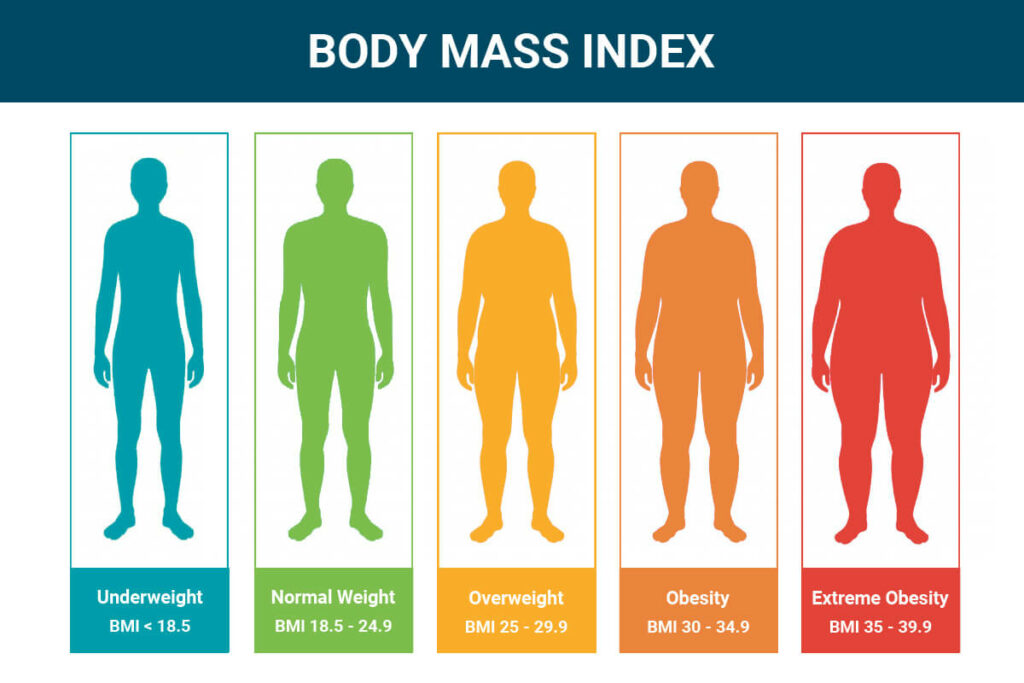
How long does Gastric Sleeve surgery take?
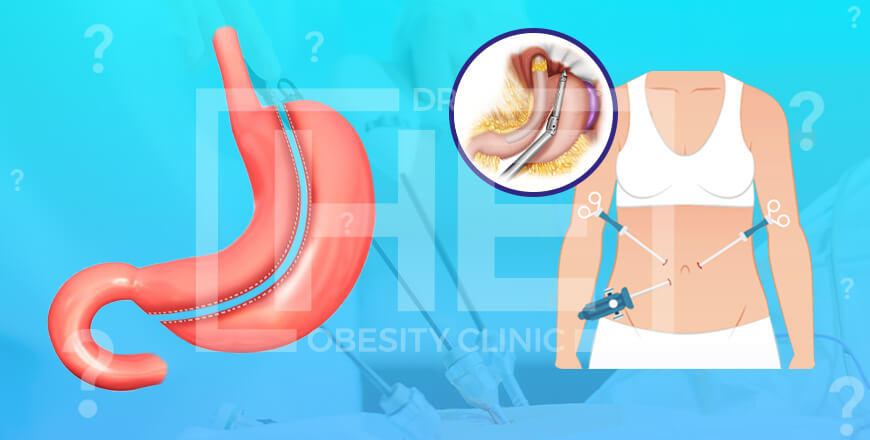
The surgical procedure known as Gastric Sleeve Surgery, or sleeve gastrectomy, is conducted under the administration of general anaesthesia and typically requires an average duration of 1.5 hours for its completion. Given that the exit and entrance segments of the stomach remain intact, thereby ensuring the continuity of the digestive system, the postoperative risks are comparatively low, with a minimal occurrence of adverse side effects.
Presently, gastric sleeve surgery stands as the prevailing surgical modality for the management of obesity. Nevertheless, akin to any other surgical procedure, stomach reduction surgeries may yield adverse outcomes if not executed by a proficient team within suitable circumstances and employing the correct methodology.
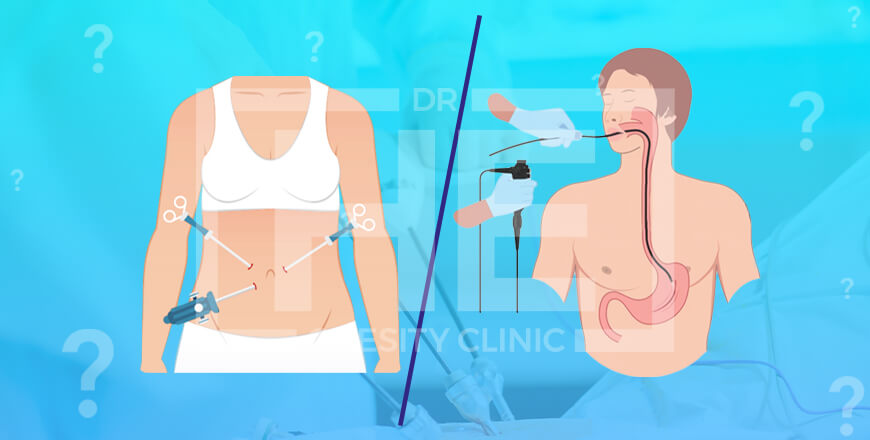
Endoscopic Gastric Sleeve Surgery entails the endoscopic reduction of a specific portion of the stomach, devoid of any incisions, in contrast to conventional surgical procedures. Following the procedure, patients have the opportunity to embark upon a salubrious weight reduction journey, whereby expeditious attainment of enduring outcomes becomes feasible. On average, patients tend to observe a weight reduction ranging from 17% to 20% by the conclusion of the initial year. This methodology not solely facilitates the attainment of the intended aesthetic semblance, but also serves as a preventive measure against a multitude of grave maladies associated with obesity.
It is of utmost significance to acknowledge that the procedure known as Endoscopic Gastric Sleeve surgery entails the reduction of the stomach’s size through an endoscopic approach. This method involves gaining access to the stomach via the oral cavity, thereby obviating the need for any incisions.
On the contrary, Laparoscopic Gastric Sleeve surgery is a surgical modality that affords patients a swifter recuperation period and diminished discomfort in comparison to open surgery. Laparoscopic surgery, in comparison to conventional surgical procedures, is characterised by its reduced invasiveness and heightened patient comfort.
Patients who undergo this procedure exhibit a swifter recuperation and encounter diminished levels of discomfort throughout the convalescence period. Moreover, laparoscopic surgery serves to diminish the duration of the operation, whilst concurrently mitigating the risk-to-benefit ratio.
What are the differences between Laparoscopic and Endoscopic Gastric Sleeve Surgery?
How long do Gastric Sleeve results last?
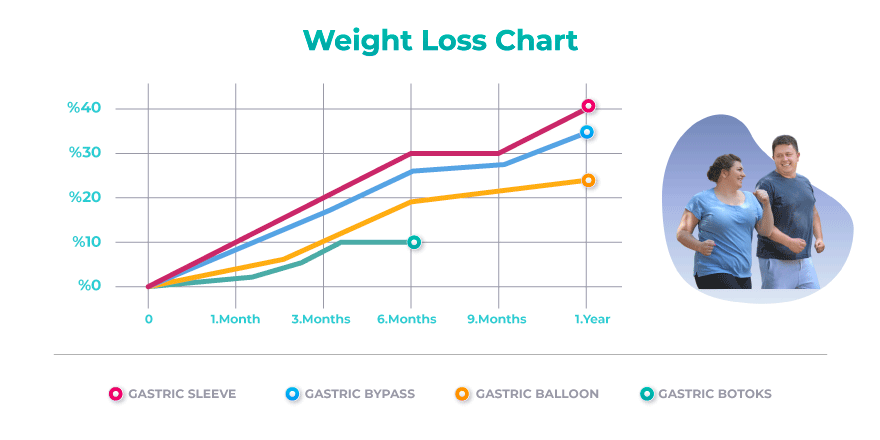
Achieving the best results after Gastric Sleeve Surgery often unfolds over a timeline reflective of individual patient profiles and adherence to postoperative dietary recommendations. Typically, a span of three months post-surgery marks the initial phase of noticeable improvements. Yet, it is within the one-year mark that the enduring effects of the surgery tend to fully materialize. The journey to this milestone is gradual, requiring unwavering commitment to nutritional guidelines that are crucial for success.
It is essential to recognize that the surgical technique employed plays a significant role in the recovery and outcome timeline. Various procedures, each with its own set of protocols and recovery expectations, include:
- Endoscopic Sleeve Gastroplasty, which is less invasive and may lead to a quicker initial recovery.
- Vertical Sleeve Gastrectomy, the standard approach that has been the foundation for the procedure’s global adoption.
- Mini Gastric Sleeve in Turkey, a variation that caters to specific patient needs.
- Robotic Gastric Sleeve in Turkey, which utilizes cutting-edge technology for precision and potentially smoother recovery.
Post-surgery, patients are urged to maintain a disciplined approach to their diet. This discipline extends to regular consultations with healthcare providers, ensuring that any adjustments to dietary plans are made promptly and progress is carefully monitored. Adherence to these guidelines is not merely beneficial; it is imperative for the patient’s transformation. Notably, the absence of such commitment could delay or even negate the benefits the surgery aims to provide.
Conclusively, while the time to reach the pinnacle of one’s postoperative potential varies, a period of three to six months is a reasonable expectation for significant progress. Beyond this, the journey to long-term health continues, underpinned by a consistent dietary and medical follow-up routine.
Gastric Sleeve in Turkey Before & After Photos




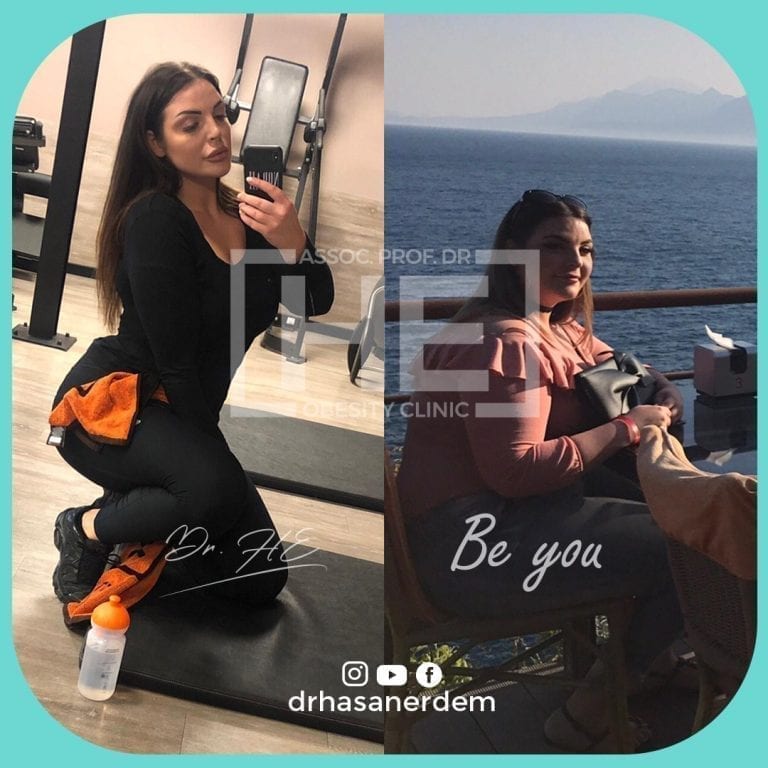

How many pounds can be lost with Gastric Sleeve ?
Typically, following gastric sleeve surgery, the majority of patients attain a state of optimal leanness, exhibiting a weight reduction rate of approximately 70% in relation to their surplus weight. The primary period during which weight loss predominantly transpires is within the initial year, with the potential for further weight reduction in the subsequent year. However, it is customary for the weight to subsequently stabilise.
As an illustration, a patient with a height of 160 cm and a weight of 124 kg possesses an optimal upper weight threshold of 64 kg, thereby exhibiting a surplus weight of 60 kg. This implies that the patient experiences a reduction of 70% in their surplus weight, equating to 42 kg, thereby resulting in a final weight of 82 kg.
Losing weight subsequent to undergoing gastric sleeve surgery is an exceedingly challenging feat to circumvent. Nevertheless, whilst certain patients may successfully attain their desired weight, others may encounter inadequate progress in terms of weight reduction. In subsequent analyses encompassing extensive cohorts of patients, the observed proportion of sustained weight reduction over an extended period is approximately 85-90%. A minority of patients may encounter recurrent weight gain over an extended duration, albeit the probability of reverting to the previous weight is merely 1%.
Gastric sleeve surgery, akin to all obesity procedures, does not proffer a definitive quantification of weight reduction. Nevertheless, the closed gastric sleeve procedure effectively curtails one’s appetite by imposing restrictions on the quantity of food that can be consumed during a single sitting.
Patients who commence experiencing weight loss promptly observe a favourable alteration in their cognitive disposition. By interrupting the recurring pattern of constrained daily existence, suboptimal dietary habits, and sedentary behaviour within a concise timeframe, the facilitation of embracing a more salubrious way of life becomes more feasible. Consequently, individuals who adhere to a consistent daily regimen subsequent to surgical intervention, encompassing a well-balanced dietary intake and engagement in physical exertion, attain more favourable outcomes.
What are the Advantages of Gastric Sleeve Surgery ?
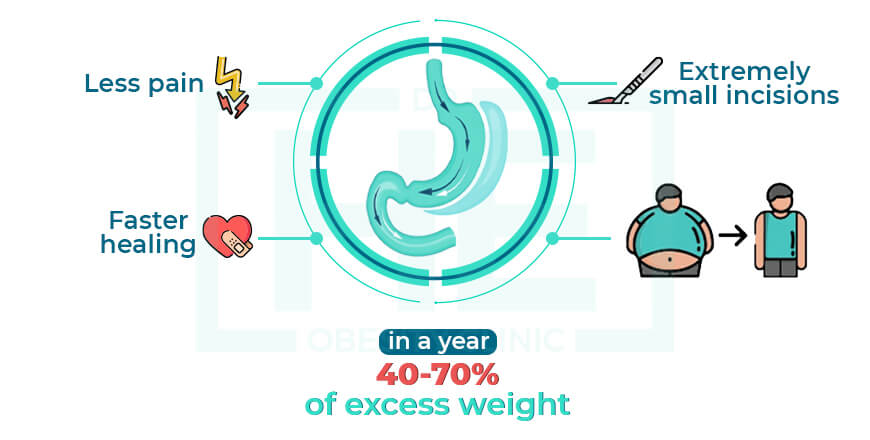
Opting for a laparoscopic sleeve gastrectomy in Turkey introduces patients to a spectrum of advantages. The surgical technique is characterized by smaller dermal incisions, which inherently lead to a decrease in postoperative discomfort. In addition, these less invasive measures significantly curtail the risk of infection. Patients benefit from a swift recovery, which allows for a quicker return to their everyday activities, marking a milestone in their health journey. The shortened hospital stay associated with this procedure is not only a convenience but also a testament to its efficiency.
The advantages of gastric sleeve surgery are further underscored by the impressive weight loss outcomes reported:
- Patients typically experience a substantial reduction in excess weight, often seeing a 40% to 70% decrease within the first year post-surgery.
- The procedure preserves the stomach’s natural functionality by avoiding alterations to its entry and exit points, which aids in maintaining normal digestive processes.
- Given that the surgery does not involve any rerouting of the small intestine, the likelihood of nutrient absorption issues is markedly reduced, safeguarding patients against potential vitamin and mineral deficiencies.
These benefits collectively underscore the effectiveness of the gastric sleeve surgery. The procedure’s approach and subsequent results position it as a preferred option for those seeking a transformative and medically prudent solution to obesity. Turkey’s medical sector, with its combination of advanced techniques and affordable care, has become an attractive destination for this life-enhancing surgery. Patients leave with not just physical changes but also with a renewed outlook on life, empowered by the comprehensive benefits the gastric sleeve surgery offers.
How Is The Recovery Process After Gastric Sleeve Surgery?
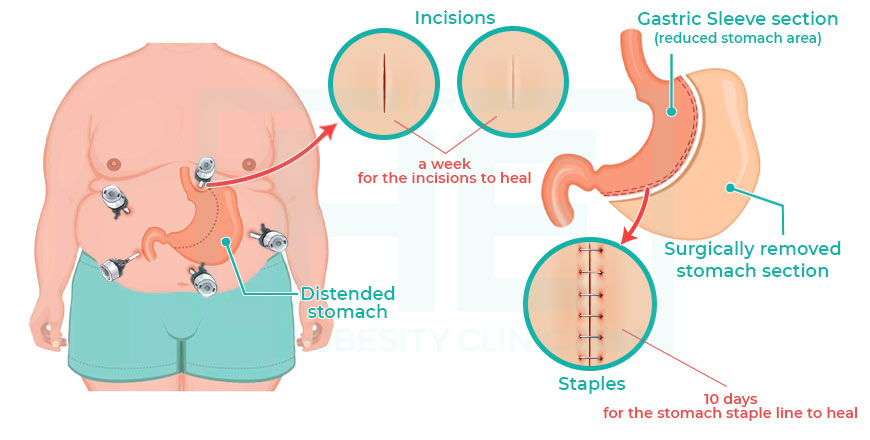
Recovery following gastric sleeve surgery is a structured process, meticulously planned to ensure patient well-being and optimal healing. Individuals from desk-bound professions generally find themselves capable of returning to their work life within a week to ten days post-operation. Those with more physically demanding roles are advised to allow for up to three weeks before resuming their rigorous tasks. The objective is to avoid exertion that could strain the abdomen and compromise recovery.
During this critical period, patients are encouraged to gradually reintegrate into their usual activities. Such gentle movements are pivotal in reducing the risk of blood clots and facilitating a quicker return to normalcy. The laparoscopic nature of the surgery, involving minimal incisions, aids in a swift recovery. These small surgical entries on the skin are typically healed within seven days, while the internal sutures take a slightly longer period of about ten days to heal completely.
Key aspects of the postoperative recovery include:
- Avoidance of strenuous physical labor, particularly activities that could impose stress on the abdominal area.
- Adherence to a balanced diet is crucial, as proper nutrition supports healing and adapts the body to its new gastric capacity.
For patients not involved in physically taxing jobs, it is possible to resume work duties around a week after surgery. This swift return to employment is a testament to the effectiveness of the laparoscopic technique. Overall, the recovery journey is designed to be as smooth as possible, allowing patients to quickly regain autonomy and step back into their lives with new vigor and a healthier outlook.
What is the Prices of Gastric Sleeve Surgery in Different Countries?
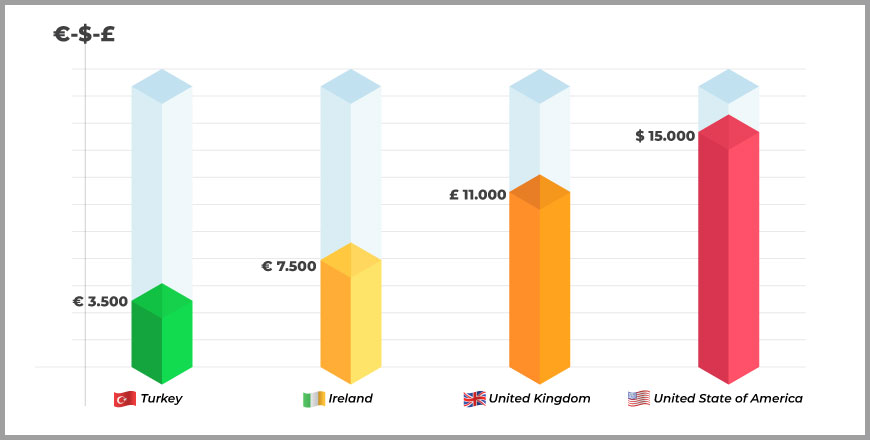
How Much is a Gastric Sleeve Surgery in Turkey ?
How much is a gastric sleeve in Turkey? Gastric sleeve Turkey prices; In the realm of medical tourism, Turkey positions itself as a highly competitive player, especially when it comes to the realm of bariatric surgery. The cost of gastric sleeve surgery in this nation is notably reasonable, starting at €3,000.00 and capping at approximately €5,000.00, depending on various determinants. Within the bustling city of Istanbul, patients can anticipate a median charge of €3,500.00, a fee that encompasses an all-inclusive care package. This package typically covers all necessary facets of the procedure, making it a financially prudent choice for many.
Financial considerations remain paramount for patients opting for gastric sleeve surgery in Istanbul. Hence, the affordability of this procedure in Turkey is appealing, especially in contrast to the higher prices often seen in other countries. Notably, the cost can vary significantly based on the clinic’s reputation and the included services.
The comprehensive package usually includes:
- Pre-operative tests and assessments.
- The surgery itself, conducted by experienced surgeons.
- Post-operative care and follow-up consultations.
- Accommodation and sometimes even transportation for international patients.
The variation in cost is also influenced by the patient’s specific health requirements. For instance, individuals with complex medical histories may necessitate additional pre-operative evaluations. Moreover, the extent of post-operative care can also alter the overall expense. It is thus essential for patients to engage with qualified medical professionals in Turkey to gain an accurate estimate tailored to their unique circumstances.
In summary, Istanbul offers an economical yet high-quality option for gastric sleeve surgery. While the prices fluctuate, the quality of care provided remains consistently high, ensuring that patients receive the best possible outcome from their surgical experience in Turkey.
Gastric Sleeve Surgery Turkey Price
Gastric sleeve surgery Turkey price, In Turkey, gastric sleeve surgery is a popular choice for both local and international patients. The country has established itself as a leading destination for medical tourism, offering high-quality healthcare services at affordable prices. Turkey’s advanced medical facilities, experienced doctors, and competitive pricing make it an attractive option for individuals seeking gastric sleeve surgery.
The cost of gastric sleeve surgery in Turkey can vary depending on several factors such as the hospital or clinic, the surgeon’s experience, the patient’s specific medical needs, and additional services included in the treatment package. On average, the price for gastric sleeve surgery in Turkey ranges from €3,500 to €5,000. This cost often includes pre-operative consultations, the surgical procedure, hospital fees, post-operative care, and sometimes accommodation and transportation arrangements for international patients.
It’s important to note that while cost is an important consideration, the quality of care and expertise of the medical team should be the primary factors in choosing a healthcare provider for gastric sleeve surgery. Patients should thoroughly research their options and consider factors such as the surgeon’s credentials, the facility’s accreditation, and patient reviews when making their decision.
Gastric sleeve surgery in Turkey offers an affordable and high-quality option for individuals seeking effective treatment for obesity. With its experienced medical professionals and modern healthcare facilities, Turkey has become a top choice for patients considering weight-loss surgery. However, it’s essential for patients to thoroughly research their options and prioritize the expertise and reputation of the healthcare provider when making decisions about their treatment.
Gastric sleeve surgery cost in Turkey varies depending on the experience of the surgeon who will perform the surgery, the standards and location of the hospital, the quality of the medical supplies to be used during surgery, and the individual needs of the patient. Prices are usually between €2,000 and €4,500. However, some factors may increase or decrease the price, such as:
• The duration of the hospital stay and the type of the room.
• The inclusion of preoperative and postoperative tests, medications, and consultations.
• The inclusion of accommodation, transportation, and other services for the patient and the companion.
• The exchange rate of the Turkish Lira and the currency of the patient.
• Turkey is one of the most preferred destinations for gastric sleeve surgery, because:
• It has highly qualified and experienced bariatric surgeons who have international accreditations and certifications.
• It has modern and well-equipped hospitals that have Joint Commission International (JCI) accreditation and follow international standards of excellence.
• It offers affordable and all-inclusive packages that cover all the medical and non-medical expenses of the patient.
• It has a rich and diverse culture, history, and nature that can make the patient’s stay more enjoyable and relaxing.
| Cost of Gastric Sleeve in Turkey (Price Comparison) Gastric sleeve Turkey price | |
| Turkey | €3.500 |
| USA | $15.000 |
| UK | £11.000 |
| Ireland | €7.500 |
| South Africa | $15.000 |
| Saudi Arabia | $8.250 |
| Australia | $20.000 |
| Canada | $18.000 |
Gastric sleeve cost Turkey has become a popular destination for medical tourism, offering high-quality healthcare services at affordable prices. The cost of gastric sleeve surgery in Turkey can vary depending on several factors, including the specific clinic or hospital where the procedure is performed, the experience and expertise of the surgeon, the type of aftercare and support provided, and any additional services included in the package.
With its cost-effective healthcare services, experienced surgeons, and world-class facilities, patients can undergo gastric sleeve surgery in Turkey with confidence and peace of mind.
Gastric Sleeve in Turkey Reviews
Gastric sleeve Turkey reviews, Turkey’s status as a hub for medical tourism is solidified by its proficiency in performing gastric sleeve surgeries, a process that has garnered widespread acclaim. The country’s medical establishments are reputed for delivering exceptional care in this domain. They offer services that cater not only to domestic patients but also to an international clientele drawn by the high standards of treatment. The efficacy of the gastric sleeve, or vertical sleeve gastrectomy, is evidenced by the positive feedback from individuals who have undergone the procedure within Turkey’s medical facilities. These recipients of care often report substantial weight loss, which leads to enhanced health and vitality.
The benefits extend beyond physical well-being, with many patients noting a marked enhancement in their quality of life post-surgery. This includes:
- An increase in mobility and ease of engaging in daily activities.
- A reduction in obesity-related health issues, which previously curtailed their lifestyle.
- A newfound confidence stemming from their weight loss and improved health.
Moreover, the financial aspect of gastric sleeve surgery in Turkey is noteworthy. The cost is relatively lower compared to that in other nations, which positions Turkey as an accessible option for many. This affordability does not compromise the quality of care, as Turkish medical professionals are recognized for their expertise and the use of advanced surgical techniques.
The positive reviews and testimonies from patients underscore the success of these procedures. They reflect a high degree of satisfaction with the surgical outcomes, reinforcing Turkey’s esteemed position in the realm of bariatric surgery. Therefore, for individuals contemplating gastric sleeve surgery, Turkey presents a compelling choice that combines quality healthcare with economic viability.
Gastric Sleeve Turkey Reviews: What You Need to Know
If you’re considering gastric sleeve surgery in Turkey, you’re not alone. Many people are turning to Turkey for affordable and high-quality medical procedures, including weight loss surgeries. But before you make any decisions, it’s important to do your research and read reviews from others who have undergone the same procedure. In this article, we’ll explore gastric sleeve Turkey reviews and provide you with the information you need to make an informed decision.
Why Turkey for Gastric Sleeve Surgery?
Turkey has become a popular destination for medical tourism, and for good reason. The country offers high-quality medical care at a fraction of the cost compared to many Western countries. In addition, Turkey has a number of internationally accredited hospitals and highly qualified medical professionals who are experienced in performing gastric sleeve surgery.
Gastric Sleeve Turkey Reviews
Gastric sleeve Turkey reviews; Before undergoing any medical procedure, it’s important to read reviews and testimonials from others who have had the same surgery. Gastric sleeve Turkey reviews can provide valuable insight into the experiences of past patients, the quality of care received, and the overall outcome of the surgery.
Many individuals who have undergone gastric sleeve surgery in Turkey have reported positive experiences. They praise the professionalism and expertise of the medical staff, as well as the high standard of care provided before, during, and after the surgery. Patients often highlight the affordability of the procedure in Turkey compared to their home countries, making it a cost-effective option for those seeking weight loss surgery.
However, it’s important to note that not all reviews may be positive. Some patients may have had less-than-ideal experiences or encountered complications during or after the surgery. It’s crucial to consider both positive and negative reviews to gain a comprehensive understanding of what to expect when undergoing gastric sleeve surgery in Turkey.
Best Doctor for Gastric Sleeve in Turkey
Best doctor for gastric sleeve in Turkey and best hospital in turkey for gastric sleeve, are you considering undergoing gastric sleeve surgery in Turkey? If so, you’ll want to ensure that you find the best doctor to perform this life-changing procedure.
Factors to Consider When Reading Reviews
When reading gastric sleeve Turkey reviews, there are several factors to consider to ensure you’re making an informed decision:
1. Quality of Care: Pay attention to comments about the quality of care received at the hospital or medical facility. Positive reviews should highlight the professionalism and expertise of the medical staff, as well as the cleanliness and overall environment of the facility.
2. Success Stories: Look for success stories from patients who have achieved significant weight loss and improved health following gastric sleeve surgery in Turkey. These testimonials can provide encouragement and hope for those considering the procedure.
3. Complications and Risks: Be mindful of any reviews that mention complications or risks associated with the surgery. While all surgeries carry some level of risk, it’s important to understand what potential complications may arise and how they were addressed by the medical team.
4. Affordability: Many individuals choose to undergo gastric sleeve surgery in Turkey due to its affordability compared to their home countries. Reviews that discuss the cost-effectiveness of the procedure can help you assess whether it’s a financially viable option for you.
Consultation and Research
While reviews can offer valuable insights, it’s essential to schedule a consultation with a qualified healthcare provider before making any decisions about gastric sleeve surgery in Turkey. During the consultation, you can discuss your specific medical history, weight loss goals, and any concerns you may have about the procedure.
Additionally, thorough research is key to understanding the entire process of undergoing gastric sleeve surgery in Turkey. This includes familiarizing yourself with the pre-operative requirements, post-operative care, potential risks and complications, and expected outcomes. Gathering information from reputable sources such as medical journals, official hospital websites, and professional medical organizations can help you make an informed decision.
Choosing a Medical Facility
When considering gastric sleeve surgery in Turkey, it’s crucial to choose a reputable and accredited medical facility with a proven track record of successful surgeries and positive patient outcomes. Look for hospitals that specialize in bariatric surgery and have experienced medical professionals who are dedicated to providing comprehensive care throughout the entire surgical process.
In addition, consider the location of the medical facility and its accessibility for international patients. Many hospitals in Turkey cater to medical tourists and offer assistance with travel arrangements, accommodations, and language interpretation services to ensure a smooth and stress-free experience for patients traveling from abroad.
Gastric sleeve surgery in Turkey can be a life-changing decision for individuals struggling with obesity and related health issues. By reading gastric sleeve Turkey reviews and thoroughly researching your options, you can gain valuable insights into the experiences of others and make an informed choice about undergoing this weight-loss procedure abroad.
Remember that every individual’s experience with gastric sleeve surgery may vary, so it’s important to consult with a qualified healthcare provider who can assess your unique situation and provide personalized recommendations.
If you’re considering gastric sleeve surgery in Turkey, take the time to explore reviews, conduct thorough research, and consult with medical professionals to ensure you’re well-prepared for the journey towards improved health and well-being.
All Inclusive Gastric Sleeve Package Turkey
Gastric sleeve surgery is a popular and effective weight loss procedure that reduces the size of the stomach and helps patients lose excess weight. However, gastric sleeve surgery can be expensive and inaccessible in some countries, especially for those who do not have adequate health insurance or medical coverage. That is why many people choose to have gastric sleeve surgery in Turkey, where they can benefit from high-quality medical services, affordable prices, and all-inclusive packages.
Turkey is one of the leading destinations for medical tourism, especially for bariatric surgery. Turkey has many advantages for gastric sleeve surgery candidates, such as:
– JCI-accredited hospitals that meet international standards of quality and safety
– Experienced and qualified surgeons who have performed thousands of successful surgeries
– State-of-the-art technology and equipment that ensure optimal results and minimal complications
– Competitive prices that are much lower than in Europe, the US, or the UK
– All-inclusive packages that cover everything from accommodation, transportation, pre-op and post-op tests, medications, supplements, nutritional support, and follow-up care
– Beautiful and diverse tourist attractions that offer a relaxing and enjoyable recovery period
Gastric sleeve surgery in Turkey is not only a medical procedure, but also a life-changing experience that can improve your health, happiness, and confidence. If you are interested in gastric sleeve surgery in Turkey, you can contact Turkey Bariatrics, one of the leading bariatric surgery providers in the country. They offer all-inclusive gastric sleeve packages for only £3,500, which include:
– Hospital and hotel accommodation
– Airport, hospital, and hotel transfers with private driver
– Preoperative and postoperative tests
– Postoperative medication
– Multivitamin and protein supplements
– Nutritional support
– 1 year follow-up
Your surgery will be performed by an SRC-accredited master surgeon who has more than 10 years of experience and more than 2,500 successful surgeries. Your surgery will also be performed using Tri-Staple™ technology, which prevents postoperative bleeding and leakage. You will also have the opportunity to enjoy the beautiful city of Antalya, where you can visit historical sites, natural wonders, and cultural attractions.
Gastric sleeve surgery in Turkey is a safe, affordable, and rewarding option for anyone who wants to lose weight and improve their quality of life. If you want to learn more about gastric sleeve surgery in Turkey, you can visit the website of Turkey Bariatrics or fill out their free online consultation form. They will get back to you as soon as possible and answer all your questions and concerns. Don’t miss this chance to start a new healthy life with gastric sleeve surgery in Turkey.Gastric sleeve in Turkey all-inclusive packages includes;
- Preoperative Examinations
- Examination of Anaesthesia Physician
- Examination of chest Diseases Physician
- Examination of Cardiology Physician
- Gastric Sleeve Surgery by Surgeon
- Latest Technology Operating Room Supplies (Medtronic)
- General Anaesthesia
- 1 Year Post-Operation Physician control (via WhatsApp)
- 1 Year Dietician Support after Operation (via WhatsApp)
- Lifelong Patient Care after Operation (via WhatsApp)
- Drugs to be used after surgery
- Supplements to be used after surgery
- Varicose Vein Stockings
- Breathing Exercise Device
- VIP Transfers (SAW Airport-hotel, hotel-hospital, etc.)
- 3-4 Nights Hotel Accommodation
*Not including flights
How Long Do You Stay in Turkey After a Gastric Sleeve?
The recovery period following gastric sleeve surgery in Turkey is a tailored experience, varying from patient to patient. Postoperative care in Turkey prioritizes the patient’s unique healing process, ensuring that the duration of their stay aligns with the specific needs of their recovery. Upon completion of the surgery, the medical team meticulously plans the patient’s recuperation timeline.
Initially, patients embark on their recovery journey under the vigilant care of medical professionals. This period is crucial, offering the patient structured support as they take their first steps towards a new lifestyle. The team of specialists monitors the patient’s progress, making adjustments to the recovery plan as needed.
Patients typically observe the following postoperative protocol:
- Regular follow-up appointments to monitor health indicators.
- Nutritional guidance to adapt to their new dietary requirements.
- Physical therapy sessions, if recommended, to enhance mobility.
As the patient’s condition stabilizes, the focus shifts towards ensuring a smooth transition to their home environment. The medical staff provides comprehensive advice on managing the healing process at home, which includes:
- Strategies for effective pain management.
- Techniques for wound care to prevent infection.
- Exercises to promote circulation and prevent blood clots.
Furthermore, the patient receives guidance on recognizing signs that may indicate complications, which is essential for prompt medical intervention. The overarching goal is to foster a recovery that is not only swift but also sustainable. Turkey’s medical tourism infrastructure is equipped to support a diverse array of postoperative needs, cementing its status as a trusted destination for gastric sleeve surgery. Ultimately, the concerted efforts of the patient and the healthcare team culminate in a recovery that paves the way for a healthier future.
Gastric sleeve surgery, also known as sleeve gastrectomy, is a popular weight loss procedure that involves reducing the size of the stomach to help patients lose weight. Many people travel to Turkey to undergo this surgery due to the high quality of medical care and affordable prices. If you are considering gastric sleeve surgery in Turkey, you may be wondering how long you will need to stay in the country for the procedure and recovery.
The length of time you will need to stay in Turkey after a gastric sleeve surgery can vary depending on several factors, including your individual healing process and any potential complications. In general, most patients are advised to stay in Turkey for at least 7-10 days following the surgery. This allows for adequate time for post-operative care, monitoring, and follow-up appointments with your surgeon. During your stay in Turkey, you will need to attend several post-operative check-ups with your surgeon to ensure that you are healing properly and to address any concerns or questions you may have. Your surgeon will also provide you with detailed instructions for post-operative care, including dietary guidelines, activity restrictions, and medication management. It is important to remember that everyone’s recovery process is unique, and some patients may require a longer or shorter stay in Turkey depending on their individual circumstances. Your surgeon will be able to provide you with personalized guidance based on your specific needs and progress following the surgery.
In addition to the medical aspects of your stay, it’s important to consider the practicalities of traveling to and staying in Turkey for your surgery. You will need to make arrangements for transportation, accommodation, and any necessary support during your recovery period. Many medical facilities in Turkey offer comprehensive packages that include assistance with these logistical details, making the process smoother and more convenient for international patients.
Before traveling to Turkey for gastric sleeve surgery, it is essential to thoroughly research and choose a reputable and accredited medical facility and experienced surgeon. Look for a facility that specializes in bariatric surgery and has a track record of successful outcomes. It’s also important to consider factors such as the quality of care, patient reviews, and the overall patient experience. The length of time you will need to stay in Turkey after a gastric sleeve surgery is typically around 7-10 days, but this can vary based on individual circumstances. It’s important to work closely with your surgeon to determine the most appropriate duration for your stay and to ensure a safe and successful recovery process. With careful planning and guidance from experienced medical professionals, undergoing gastric sleeve surgery in Turkey can be a positive and transformative experience on your weight loss journey.
Gastric Sleeve in Turkey vs UK

When deliberating on gastric sleeve surgery, cost and convenience prominently influence the decision. The United Kingdom presents a substantial financial commitment for this life-changing surgery, with the price tag often reaching £7,995. On the other hand, Turkey offers a more economical alternative, with the cost averaging around £3,250. This stark contrast in expenditure makes Turkey an attractive destination for prospective patients seeking the procedure.
Moreover, Turkey’s medical facilities, especially in Istanbul, are noted for streamlining the surgical process. This efficiency extends beyond the operating room to include the logistical aspects of the journey. Istanbul is highly accessible, thanks to the abundance of direct flights from the UK, easing the travel burden for international patients.
The advantages of undergoing gastric sleeve surgery in Turkey are not limited to financial savings:
- State-of-the-art medical infrastructure matches that of the UK.
- Surgeons in Turkey often have international training and certifications.
- The hospitals provide comprehensive care packages that include pre-operative and post-operative support.
These factors coalesce to position Turkey not merely as a cost-effective option but as a hub of medical excellence. The reduced costs do not compromise the quality of care received. In fact, the country has rapidly gained a reputation for merging affordability with high standards of healthcare.
Thus, for individuals with a BMI exceeding 35, Turkey emerges not just as a viable choice but as a prudent one. It aligns the interests of health, economics, and convenience, making it increasingly popular among those considering bariatric surgery. The blend of reduced cost, ease of travel, and quality care underpins Turkey’s status as a sought-after medical tourism destination.
Indeed, the undertaking of Gastric sleeve Surgery in Turkey can be deemed as entirely secure. Turkey boasts a plethora of highly skilled surgeons and well-equipped medical facilities. Surgery can be undertaken with a reasonable degree of safety. Furthermore, the prices exhibit a significantly more cost-effective nature in comparison to their counterparts in alternative nations. In summary, it presents numerous benefits for patients in all respects. Turkey excels in this particular aspect.
A bespoke payment scheme has been devised exclusively for your consideration in relation to the gastric sleeve surgical procedure in Turkey. It is not feasible to remunerate for this surgical procedure through a system of periodic payments. Payment is to be made in advance. Payment can be rendered either via credit card or in the form of cash. The payment must be finalised prior to the commencement of the procedure. You may opt to utilise the payment method that is most convenient for your needs. Should you opt for the all-inclusive package, you will have the opportunity to conveniently settle the costs associated with both accommodation and transportation. With the exception of the specified amount stipulated by the clinic, no further payments are required.
If one is in search of the most optimal private clinic for Gastric Sleeve surgery, one has fortuitously arrived at the appropriate destination. Dr Hasan Erdem is a highly proficient medical practitioner specialising in the field of gastric sleeve surgery. He possesses a multitude of accomplished references. He is the preeminent physician, held in highest regard by patients hailing from various European nations. All the physicians employed at our clinic possess extensive expertise in the field of gastric sleeve surgery. In Turkey, our healthcare team is widely regarded as being of the highest calibre. We extend to you the opportunity to avail yourself of the most efficacious surgical procedures within the confines of our well-appointed clinic, all at highly competitive rates.
Regrettably, that is not the case. At the esteemed Dr. Hasan Erdem Clinic, our practise is exclusively dedicated to the performance of surgical procedures that are deemed to be of utmost safety and efficacy. Due to its lack of safety and efficacy, this particular procedure is not implemented within the confines of our medical facility. We abstain from undertaking any procedure that fails to yield favourable outcomes for our patients in terms of their well-being.
The gastric sleeve procedure, renowned as one of the costliest interventions within the realm of obesity surgeries, is rendered at a considerably affordable rate within the confines of Turkey. Due to the presence of numerous proficient medical practitioners and clinics specialising in this domain within Turkey. The supply-demand flow is abundant. If one is contemplating travelling to Turkey from overseas for the purpose of undergoing gastric sleeve surgery, it is imperative to exercise prudence in making an informed decision. Turkey is an economically advantageous nation in terms of healthcare affordability.
As you may be aware, the internet serves as a vast repository of knowledge, and in contemporary times, individuals have come to depend upon Google or other search engines as a means to procure the information they seek. When purchasing a confectionery item, it is customary to seek the opinions and feedback of previous buyers.
However, when deliberating upon the choice of destination and the selection of a clinic, it is ill-advised to rely on Google as the comments found there are often subject to manipulation by individuals lacking expertise in the field of science. Rather than engaging in such activities, it would be advisable to avail oneself of the opportunity to view the recorded surgical procedures disseminated by the esteemed surgeons.
In this article, we shall elucidate the essential items that one ought to include in their packing list for bariatric surgery in Turkey. Acquainting oneself with these particulars shall facilitate the attainment of a seamless operation. Given the perception held by patients regarding the magnitude of these surgical procedures, it is imperative to acknowledge that such notions are not entirely accurate. Naturally, akin to any surgical procedure, it may present certain challenges and potentially give rise to complications.
There are certain prerequisites that must be fulfilled prior to undergoing surgery in order to mitigate potential complications. It can be readily accomplished through personal preparations or by availing oneself of the assessments proffered by one's hospital physician. The divergence in procedural norms is to be expected, given the inherent variability in the healthcare institutions or practitioners one encounters. However, in this discourse, we shall focus on the most overarching aspects.
As the date of your impending bariatric surgery draws near, it is opportune to commence preparations for your forthcoming hospital sojourn. The exhilaration associated with the journey to the medical facility and the apprehension surrounding the surgical procedure may inadvertently lead to the inadvertent omission of essential items required for one's hospital sojourn. It is advisable to conscientiously review your bariatric surgery hospital checklist several days in advance to guarantee the omission of any crucial items. It is advisable to allocate a minimum duration of two days for your stay within the hospital premises. The majority of bariatric procedures typically entail a single day of hospitalisation, although certain surgical interventions may require an extended period of two days in order to ensure enhanced postoperative care and convalescence.
The potential hazards associated with these surgical interventions in the context of therapeutic applications primarily stem from factors linked to anxiety.
Particularly in the case of individuals who are overweight, postoperative complications, including the potential for mortality, can be regarded as a significant factor contributing to a pessimistic perspective.
Mortality rates pertaining to both general and surgical categories were documented.
- 0.1% in gastric band-clamp
- 0.15% in vertical Band Gastroplasty,
- 0.54% in Gastric Bypass,
- 0.8% in Biliopancreatic diversion,
- And a 0.25% overall average when all types of surgery were evaluated in general.
Based on scientific research, it has been observed that individuals classified as overweight or obese exhibit a slightly elevated susceptibility to both appendicitis and gallbladder surgery when compared to those of average weight.
Nevertheless, such a peril does not entail fatality. In the realm of cardiovascular surgery, the mortality rate during the initial stages stands at approximately 2 percent, whereas in the domain of obesity surgery, it amounts to 1 thousand. Prior to undergoing gastric bypass surgery,
Patients are provided with comprehensive information regarding these risks by medical practitioners in hospitals conducting gastric tube surgery. Obesity surgeries do not fall under the category of aesthetic surgeries. The life expectancy of individuals classified as morbidly obese is diminished by a span of 10 to 15 years as a direct consequence of their obesity.
The risks entailed by obesity are considerably greater in magnitude when compared to the risks associated with gastric bypass surgery.
In individuals classified as morbidly obese who undergo Gastric sleeve surgery, the potential hazards linked to comorbidities, including hepatic steatosis, renal disorders, hyperglycaemia, or hypertension, are effectively mitigated.
Henceforth, bariatric surgery presents a dual nature, encompassing a modest level of risk whilst concurrently mitigating the likelihood of subsequent surgical interventions.
In the context of gastric sleeve surgery, it is pertinent to acknowledge the inherent risks associated with each surgical procedure, which are known to exert a significant impact. It is imperative that the professional team remains in your presence both prior to, during, and subsequent to the operation.
Potential complications unique to this surgical procedure encompass respiratory issues that may arise as a consequence of the mobilisation of thrombi formed within the lower extremity veins, contingent upon the patient's body mass. Furthermore, there is a notable likelihood of suture leakage and subsequent abscess formation, which manifests in approximately 1% of cases.
The rationale behind this decrease can be attributed to the extensive utilisation of the aforementioned procedure, the proliferation of proficient facilities and surgeons, as well as the progression in the employed technology.
Regrettably, we do not provide any payment plan for gastric sleeve surgery in Turkey.
The gastric sleeve surgery is a surgical intervention aimed at promoting weight loss by diminishing the dimensions of the stomach. The procedure has the potential to facilitate weight loss, mitigate the risk of cancer, and enhance one's overall quality of life. If one possesses a body mass index (BMI) of no less than 35, it is within the purview of a medical practitioner to undertake the surgical procedure.
This particular procedure is widely prevalent, and individuals who exhibit excess weight may potentially qualify as suitable candidates.
To arrive at a well-informed determination regarding the suitability of undergoing Gastric Sleeve Surgery in Turkey, it is imperative to meticulously scrutinise all pertinent particulars. These factors encompass the financial implications, the age threshold for surgical eligibility, the necessity of insurance coverage, and the mortality rate associated with the aforementioned procedure. One ought to additionally consider the potential hazards and complexities associated with the aforementioned procedure.
If one possesses an inclination towards undergoing gastric sleeve surgery, it becomes imperative to ascertain whether their insurance plan encompasses the financial aspect of this procedure.
The procedure is not encompassed by insurance in Turkey; however, rest assured that there is no need to utilise your insurance, as the operation will be conducted in a wholly secure and economically advantageous manner.
To ensure a secure and cost-effective undertaking in Turkey, it is imperative to meticulously strategize a delightful excursion.
In order to meet the eligibility criteria for the surgical procedure, it is imperative that one possesses a body mass index (BMI) of 35 or above. In order to be considered, it is imperative that one possesses a documented record of prior endeavours aimed at reducing body mass, coupled with substantiating indications of a health-conscious mode of living.
A medical practitioner shall evaluate your medical records and devise an individualised course of treatment. The medical professionals shall engage in a comprehensive examination of your mental and physical well-being, subsequently proffering recommendations pertaining to any requisite modifications that ought to be undertaken prior to and subsequent to the surgical procedure. In order to undergo Gastric Sleeve surgery, it is imperative that one attains a minimum age of 18 years.
Prior to the commencement of the Gastric Sleeve Surgery, our esteemed surgeons diligently conduct the requisite battery of tests and examinations in collaboration with the anaesthesiologist and other esteemed members of their esteemed team. After duly considering the requisite measures and promptly scrutinising the patient's medical records, Anaesthesiologists and surgeons ascertain the most suitable modality of surgical intervention for the individual in question. The surgeons shall subsequently apprise you of the potential complications and hazards prior to the commencement of the surgical procedure.
Should you desire a precise estimation, it is within our capacity to assert that the rate in question amounts to a mere 0.03% subsequent to the implementation of all necessary precautions.
If one is contemplating the option of undergoing gastric sleeve surgery, it is imperative to possess an understanding of the potential risks that may ensue. Whilst certain risks may be of a trivial nature, others possess a considerably more significant magnitude. The potential for complications may be mitigated by means of appropriate medical care and subsequent monitoring.
Several potential hazards associated with gastric sleeve surgery encompass nausea, blood clot formation, herniation, gastrointestinal obstruction, and hypoglycaemia. Patients may also encounter respiratory complications postoperatively.
A prevalent and potentially perilous complication that frequently arises is the occurrence of a leak within the staple line. A leakage has the potential to induce an infection, thereby culminating in fatality. This particular complication may manifest within the initial few days following the surgical procedure.
Wound infections have the potential to give rise to additional complications. In this particular scenario, it is possible to insert a feeding tube into the small intestine. There is also a potentiality for the occurrence of MRSA, necessitating rigorous therapeutic intervention.
Regrettably, the package does not encompass air tickets. As one may duly acknowledge, economic conditions exhibit a considerable degree of volatility on a global scale. Regrettably, it is to be noted that airfare is not encompassed within our treatment packages for the aforementioned rationale.
Nevertheless, we offer VIP packages that encompass lodging, transportation, fees for essential tests and examinations, alongside the examination itself and associated expenditures. By opting for these packages, one can circumvent any additional expenditures that may arise.
A considerable number of our esteemed visitors exhibit a preference for availing themselves of these packages, thereby safeguarding themselves against any additional expenditures that may arise.
After undergoing gastric sleeve surgery, the duration of a patient's sojourn in Turkey will be contingent upon various factors, encompassing the patient's overall well-being and the particulars of the surgical intervention. Individuals are commonly recommended to remain within the confines of the nation for a minimum duration of several days, in order to facilitate the initial convalescence process and to enable diligent supervision by medical personnel.
However, contingent upon their advancement and any plausible complications, certain individuals may require an extended duration of stay. In order to guarantee a secure and prosperous recuperation, it is imperative to adhere to the counsel provided by the surgeon and other esteemed medical professionals.



